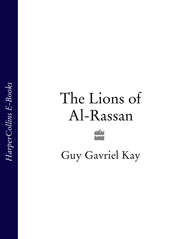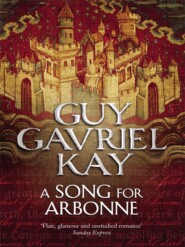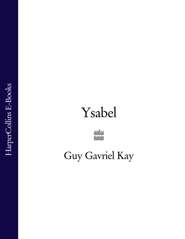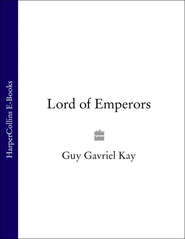По всем вопросам обращайтесь на: info@litportal.ru
(©) 2003-2025.
✖
Under Heaven
Автор
Год написания книги
2018
Настройки чтения
Размер шрифта
Высота строк
Поля
It sounded true. It was true, if you considered it. He didn’t remember considering anything at the time, however. You could say his instincts had been at work. Tai didn’t have any idea if that was so.
His sword was on his saddle, so was his bow. There was a shovel leaning against the back cabin wall. He had a fair guess by then how that had been used.
Without pausing to think, plan, to do anything coherent at all, he seized it, grabbed the door latch, and pushed, with no idea what he’d find, what he would actually do in there.
Or what they were doing, whoever these people were who had killed the shaman, buried her in earth to deny her soul access to the sky, and deceived them out in front.
It wasn’t locked, the back door. He stepped inside.
It was dark in the cabin. It had been very bright outdoors, he was nearly blind. He stopped. And just made out the shape of someone turning towards him from within the room.
Tai stepped forward and swung the shovel as hard as he could.
He felt it bite—the sharp spade edge—into flesh, and sink. The figure, still only half seen, threw up an empty hand as if in entreaty or placation, and slumped to the earthen floor.
Soundlessly. Which was good.
Tai had never killed anyone at that point in his life. He didn’t have time to consider what had just happened, what it meant, if it meant anything. He blinked rapidly, willing his eyes to adjust to shadow and dark.
Heart pounding, he made out an interior archway, a curtain over it, no actual door. A two-room cabin. He stepped over the fallen man, then—tardily—turned back and exchanged the shovel for the man’s sword.
He did kneel and check, cautiously, he was aware enough to do that. The man was dead. Another brief disturbance: how swiftly, smoothly, silently life could be present, pulsing, and then be gone.
That thought pushed him forward, treading lightly, towards the fabric curtain. He shifted a corner of it.
There were candles burning in the other room, for which Tai gave thanks. Three men. Two near the front door, whispering fiercely to each other. Tai saw that the door was barred. They wouldn’t have been able to crash in that way. Not without giving a great deal of warning.
Meshag lay on a pallet near the hearth. Tai saw that his tunic had been cut open, exposing his chest. His eyes were still closed. He looked terribly vulnerable. The third figure, tall and bulky, with animal horns attached to his head, was standing over him.
This one wore mirrors and bells and was softly beating a drum and chanting, rocking from side to side, occasionally spinning completely around. A kind of dance. There was a sickly-sweet smell in the room, something burning on a brazier. Tai had no idea what it was.
But he did not believe for a moment that this third man—it was a man, the woman was dead in the garden—was doing anything benevolent for the unconscious figure. They had killed the shaman who dwelled here. They weren’t trying to help Meshag.
They hadn’t killed him yet. Tai didn’t know why. Why should he understand any of this? But, watching through the slightly lifted curtain, breathing carefully, Tai had a disturbing sense that what was happening here was intended to be worse than killing.
He was a long way from home.
That was his last clear thought before he screamed at the top of his voice and exploded through the curtain into the front room.
He went straight for the shaman, not necessarily what an experienced soldier would have done (take out the guards!) but he wasn’t experienced, and surely his task was to try to stop whatever was being done with drum and chant and gathered powers to the man on the pallet.
He had not yet been on Stone Drum Mountain—his time among the Kanlin was a result of what happened that autumn day in the north—but he was the son of a soldier. He had been trained from earliest memory in ways and means of fighting, the more so since his older brother, soft and slightly plump even as a child, had made clear that his own inclinations and path in life did not involve swords or spinning, twisting manoeuvres against other armed men.
The dead nomad’s sword was slightly curved, shorter than Tai’s own, heavier as well, meant for downward blows from horseback. No matter. You used what you had. He had time to see the shaman turn, see fevered eyes open wide, blazing surprise and rage, before he struck a slashing blow above the metal mirrors draping the shaman’s body, protecting it.
A part of Tai, his bearings lost so far away from everything he’d ever thought he knew, enmeshed in sorcery, was surprised when the sword bit the way it should.
He felt it grind on bone, saw blood, heard the shaman cry out and fall (a sound of bells), dropping drum and mallet on the hardpacked floor. He shouldn’t have been startled: they’d killed a shaman woman, hadn’t they? These mirror-and-drum people, they were holy and feared, but they weren’t immortal.
Of course it was also possible that killing one put a curse on you for life. Not a matter Tai was in a position to address just then.
He wheeled and dropped, fear giving him urgency. He saw the nearer of the guards—the one who’d pretended to be a servant outside—rushing to where a bow lay against a wall. Tai sprang after him, twisting to dodge a knife thrown by the other man. He heard shouts outside.
He screamed again, words this time: “Treachery! Get in here!”
The false servant scrabbled for his bow, for an arrow, turned, dodging to avoid Tai’s thrust sword—or trying to avoid it.
Tai caught him in the shoulder instead of the chest, heard the man shriek in pain. Tai jerked free his blade and—instinctively—dropped and rolled again, careful of the sword he held. He banged against objects scattered on the floor (their offered gifts) but the second enemy’s sword sweep whistled over his head.
First time in his life for that sound: the sound of death averted, passing close. He heard thudding outside, and wild cries as his companions tried to get in, pounding against the barred front door.
“Around the back!” he screamed. “It’s open!”
But in the same moment he took another chance, hurtling to the door. He flung the heavy wooden bar back. Just in time he dodged again, avoiding a downward slash that bit past him into wood.
He was sent staggering as the door flew open, hitting him in the back, but something—pride and anger and fear interwoven like threads in silk—made him step towards the man left standing. Tai slashed at him, parried a hard return as the others spilled into the room behind him.
“They killed the shaman!” he cried over his shoulder. “She’s dead out back! Meshag’s over there! Watch the one on the ground! I only wounded him!”
The one on the ground was seized by three men and dragged upright, off the ground, held like a child’s doll. He received a bonesplintering blow to the side of his head. They didn’t kill him, however. Tai noticed that. And in the same moment he heard one of the Bogü say, “Leave the last one, too. We will use him.”
At those words, the man facing Tai abruptly changed his expression. Tai would remember that look, as well. He could sometimes see it when he closed his eyes in years of nights to come.
The man moved back towards the curtain. He reversed his sword, fumbling for the grip with both hands. He was trying to stab himself, Tai realized. But before that could happen, two carefully placed arrows took him one in each shoulder. The sword fell to the ground.
The man screamed then. A terrible sound, beyond any possible pain of his wounds, Tai thought.
A little later he would begin to understand.
HE’D HAVE SCREAMED like that, he found himself thinking on the ride back south (they had left that same evening, unwilling to remain by the lake, needing as much distance from it as possible).
He’d have tried to kill himself, too, if he’d had any idea what was to come before he was allowed to die. And the man had clearly known. In some ways, that was the most horrific thing.
The Kitan cavalry—Tai’s own men—had come rushing down the slope when the shouts and screaming had begun, but it was all over within the cabin before they were near enough to do anything.
Tai had walked across the grass to join them when he came out. It had been disorienting, to be back in mild sunshine with so little time having passed. The world could change too swiftly.
The thirty Kitan riders had remained apart, together, to see what the nomads would do. Watching in impassive silence at first, then with increasingly intense, shattering revulsion.
The Bogü began by claiming the body of the old shaman from out back and burning it on a pyre they built between cabin and lake. They did this respectfully, with chants and prayer. She had been defiled by murder and burial under ground, it seemed. She had to be returned to the sky—left in the open to be devoured by wolves and other animals—or she could be consumed by flame and rise with the smoke.
They chose fire, because they were beginning a greater burning. They set the outbuildings alight, and then the cabin itself, but not before they brought out Meshag upon his pallet and laid him down in the yard. They dragged out the two men Tai had killed, the guard and the shaman, and finally they brought forth the two who were still alive. They were drinking by then, the Bogü: there had been kumiss in the cabin.
The shaman’s bells chimed as they pulled his body across the trampled grass. His mirrors glinted, splintering sunlight. Tai had wondered if he’d transgressed in killing this man. It was not so, he understood now. He had done something, in the nomads’ eyes, that marked him as a hero. He was to be honoured, it seemed.
They invited him to join in what was now to follow, with the two dead men and the two left deliberately alive. He declined. Stayed with his men, his own people, from a civilized place.
He was physically sick, wrackingly so, when he saw what came next. What he had been invited to share. Many of the Kitan cavalry became violently ill, stumbling or riding away, retching into the grass.











